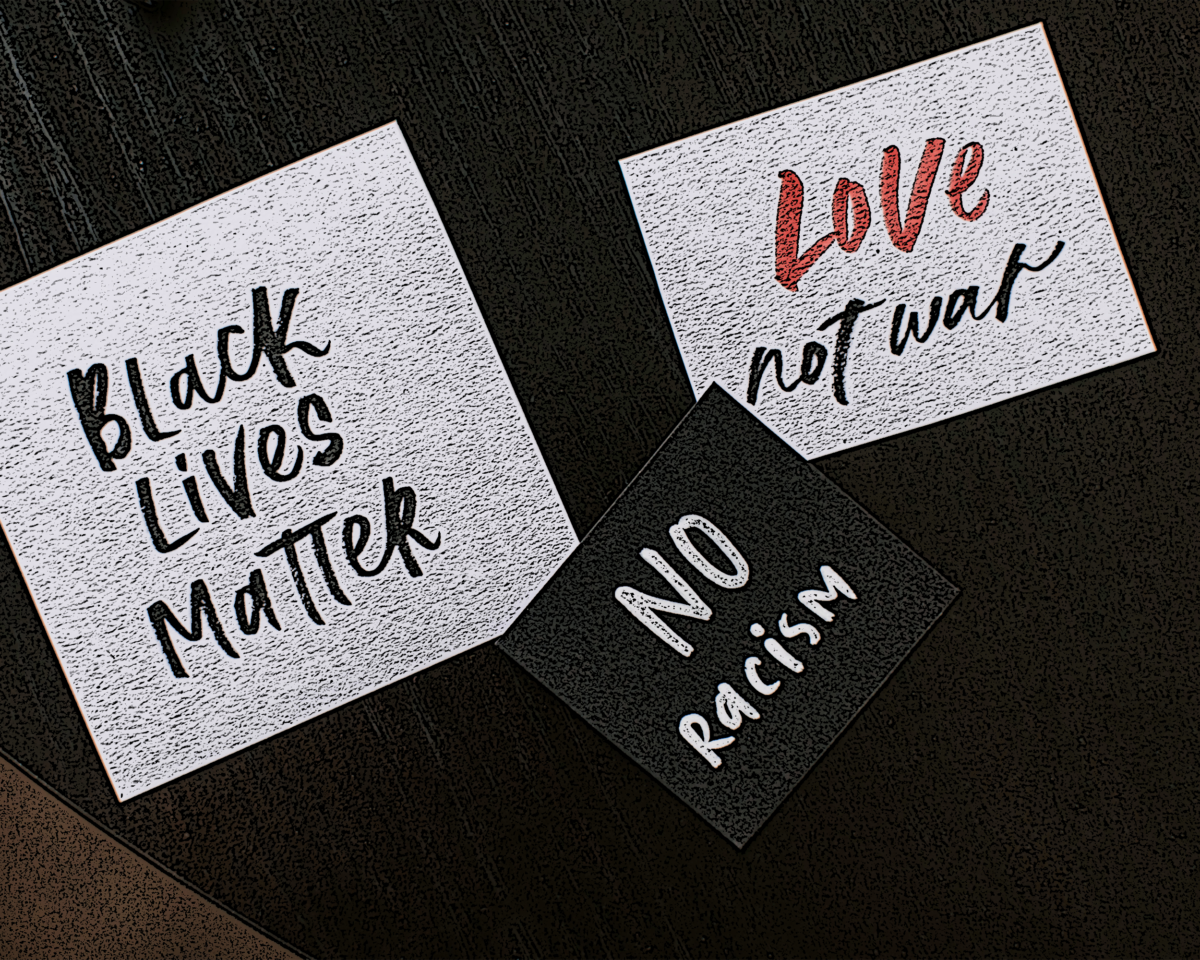I know you; you’re an ally. You read the books, you listen to the podcasts, and you wear the pins. I get it. (Here’s a secret — I have all the pins, too.) Recently, I was quarantine cooking and listening to the Queerology podcast, “On Performative Allyship and Black Joy,” and guest Rev. Broderick Greer said, “Who says that someone is an ally?”[i] Rev. Greer goes on to say, “I would love to think that I’m an ally of trans people, but I’ve never been given that moniker… at best, I’m aspiring to be an ally or an accomplice. I’m giving myself over to that process.”[ii] I stopped what I was doing. “Wait, what? I can’t call myself an ally?” I said aloud to myself in my kitchen. Then I backed up the podcast and played it again. I pride myself on being an ally, you see, both in my anti-racism work, and in my work to help create safe and brave spaces for LGBTQIA+ teenagers in the church. It’s part of my identity.
And yet, I thought about it some more, read some more, and listened some more. I discovered when you listen closely, you will hear this refrain from BIPOC and queer folks. As Kashif Graham and Rev. Greer talked, they highlighted important themes for those of us practicing allyship or doing the work of an accomplice (a delineation they explore in the podcast). They pose the question for us listeners to ask of ourselves: am I “doing the quiet, behind-the-scenes work that is making something more accessible, more humane, more beautiful for someone I love.”[iii] Well … are you?
There have been debates recently about what constitutes optical or performative allyship these days. Author Layla Saad quotes her colleague and friend Latham Thomas when Thomas defined optical allyship as such: “allyship that only serves at the surface level to platform the ‘ally,’ it makes a statement but doesn’t go beneath the surface and is not aimed at breaking away from the systems of power that oppress.”[iv] Optical allyship comes up in conversations about activism and support: Where am I spending my money? What will this social media post ACTUALLY accomplish? Should I take a picture at this protest? How am I supporting the liberation of marginalized people with the purchase of this statement t-shirt?
As I thought more about this framework and performative allyship from my position as a person of faith, practicing being an accomplice, doing justice and liberation-focused work, guess who came to mind? Peter. Oh, Peter. Now I want to be clear. Peter is named a disciple and is named as beloved by the writer of John. So, he gets some high praise in Scripture. But it struck me how Peter is always around for the show, but misses out on the “quiet, behind-the-scenes work” to borrow a phrase from Rev. Greer.
Now, this may be a controversial statement, but stick with me: Peter is a world class, first century suck-up. He’s also performative. If he had had a smartphone, he would have done all sorts of stuff with Jesus “for the gram.” He offers to build tents/dwellings on a mountain top for Jesus, Moses and Elijah (Matthew 17:4), he jumps out of a boat and demands Jesus help him walk on water (Matthew 14:28), and he thrice denies that his close friend is the Son of God (which is in all 4 gospels, but check out Luke 22:54-62). Peter shows up, he shows off, he tries to get all the gold stars from Jesus, and then he bails. When agents of the state, imbued with power, question his authority, and ask him about the identity of his arrested friend, he leaves his allyship behind. He doesn’t want to lose his power or his standing, and sensing the violence to come, he abandons his moniker of friend and ally. When there is a crowd, or on the water or during the glamor of the Transfiguration, Peter is there, waving his pride flag of support, but when it comes to the loss of his privilege? Well… we know what happened. He doesn’t stand up to the systems of power. He shrinks back into the comfort of relative anonymity.
In order to look at Peter as ally, we have to look at Jesus. Rev. Elizabeth Edman asserts that queerness is at the heart of Christianity in the introduction of her book Queer Virtue, “I mean ‘queer’ as something that has at its center an impulse to disrupt any and all efforts to reduce into simplistic dualisms our experience of life, of God.”[v] Rev. Edman continues, “It is not a stretch to see how Jesus ruptured simplistic dualisms all the time: life and death, human and divine, sacred and profane.”[vi] Pastor and author Rev. Mihee Kim-Kort connects the framework of “queering” to Jesus’s identity and points out Jesus’s normality in his context while he also “seems to reject societal norms.”[vii] Kim-Kort asserts [in examining the interaction between Jesus and the Samaritan woman]: “This capacity to work on and against the ideological structures that would normally prohibit their interaction is part of the core of Jesus’s queerness. Rather than succumbing to these expectations, he disidentifies with the powers that dictate who, what, when, and where he interacts with others.”[viii] Both Edman and Kim-Kort remind us that Jesus breaks the binary, that his identity is not restricted by social constructs or powers and principalities.
After Peter’s denial, and the state-sanctioned violence and torture of the crucifixion, we find ourselves at the foot of the cross. In contrast to Peter’s behavior, “the women” followed Jesus’s body after his death, prepared oils, spices, then they rested. After the Sabbath, they brought spices to the tomb and found it empty. (Luke 23:55 – 24:1) They practiced the spiritual gift of presence, spent time quietly working and resting after the death of their friend and Lord. They were separate in their grief from the other disciples, including Peter. It is important to note here that the women didn’t have the same privileges as Peter, they didn’t have much to lose in this moment. They practice being accomplices, while they too are marginalized in society.
In many modern retellings of the story, the women are often overlooked as the ones who brought the message of the empty tomb to the rest of the disciples. It is here that Peter alone wakes up a bit and immediately believes the women when his fellow bros do not. (Luke 24:12) He shakes off his need to perform in the face of the power of the Resurrection. We are all works in progress, and here, I assert, is the work of the παράκλητος, or the Holy Spirit, that works through Peter and leads him to the tomb to contemplate what has happened… alone and away from the crowds. As “woke” as Peter appears in this moment, the gospel of John tells us that Peter shouts and jumps into the water to meet the resurrected Jesus in John 21:7, so he doesn’t fully leave his performative ways behind. As Kashif Graham said on Queerology, “It’s a process.”[ix]
As we who are Christian walk the path of allyship or practice being an accomplice, we will have pushback from those in power. We will have people who will push and threaten; those who try to infringe on the rights of those whom we love, those who are marginalized, those whom we are called to love as ourselves. Those of us with privilege will need to lose it in order to walk alongside those who are marginalized and oppressed. Isn’t that what Jesus is trying to tell us about the coming kin-dom of God in Luke 17:33, “Whoever tries to preserve their life will lose it, but whoever loses their life will preserve it.” To do the work that helps bring about the kin-dom of God, we can’t expect a basket of “ally cookies”[x] (as Layla Saad names them) or recognition. To do the quiet work, perhaps to be forgotten when the story is told decades later, to plant seeds that won’t bloom in our generation. To work for liberation and justice of all means playing the long game. Don’t expect a miraculous transformation or a dramatic walk on the water. Following Jesus means being present with the marginalized and oppressed, loving your neighbor as yourself, and leaving your ego at the door. Take a page out of the playbook of the women: follow Jesus, prepare, be present, do the behind-the-scenes work, rest, and then get up the next day and do it again.
[i] Kashif Graham & Broderick Greer, “On Performative Allyship and Black Joy,” Queerology: a podcast on belief and being, <https://matthiasroberts.com/queerology/on-performative-allyship-and-black-joy/>, Season 4, Ep. 7, June 2020.
[ii] Kashif Graham & Broderick Greer, “On Performative Allyship and Black Joy,” Queerology: a podcast on belief and being, <https://matthiasroberts.com/queerology/on-performative-allyship-and-black-joy/>, Season 4, Ep. 7, June 2020.
[iii] Kashif Graham & Broderick Greer, “On Performative Allyship and Black Joy,” Queerology: a podcast on belief and being, <https://matthiasroberts.com/queerology/on-performative-allyship-and-black-joy/>, Season 4, Ep. 7, June 2020.
[iv] Layla F. Saad, Me and White Supremacy: Combat Racism, Change the World, and Become a Good Ancestor (Napreville, Illinois: Sourcebooks, 2020), 157.
[v] Elizabeth M. Edman, Queer Virtue: What LGBTQ People Know About Life and Love and How It Can Revitalize Christianity, Queer Action/queer Ideas (Boston: Beacon Press, 2016), 3.
[vi] Elizabeth M. Edman, Queer Virtue: What LGBTQ People Know About Life and Love and How It Can Revitalize Christianity, Queer Action/queer Ideas (Boston: Beacon Press, 2016), 4.
[vii] Mihee Kim-Kort, Outside the Lines: How Embracing Queerness Will Transform Your Faith (Minneapolis, MN: Fortress Press, 2018), 52.
[viii] Mihee Kim-Kort, Outside the Lines: How Embracing Queerness Will Transform Your Faith (Minneapolis, MN: Fortress Press, 2018), 52.
[ix] Kashif Graham & Broderick Greer, “On Performative Allyship and Black Joy,” Queerology: a podcast on belief and being, <https://matthiasroberts.com/queerology/on-performative-allyship-and-black-joy/>, Season 4, Ep. 7, June 2020.
[x] Layla F. Saad, Me and White Supremacy: Combat Racism, Change the World, and Become a Good Ancestor (Napreville, Illinois: Sourcebooks, 2020), 226.

Sarah Leer (she/her/hers) is a native Arkansan who served PCUSA churches in Austin, Northwest Arkansas, and currently serves in Dallas, TX. Sarah is a graduate of Wake Forest University, Columbia Theological Seminary, and the Clinton School of Public Service. She is a practical theologian who is working on her Doctorate in Educational Ministry at Columbia Theological Seminary. A lifelong Presbyterian, Sarah has served as a Young Adult Volunteer in New Orleans, as the Moderator of the Young Adult Volunteer Alumni Council, as the Adult Co-Moderator for the Youth Advisory Team and on CPM for the Presbytery of Arkansas, and on the board of the Presbyterian Youth Workers’ Association. Sarah enjoys singing Broadway songs in her car, random road trips and adventures, geeking out over pop culture, traveling the world with friends, hanging out with her family, watching college football, and attending youth conferences that include energizers.






Unbound Social